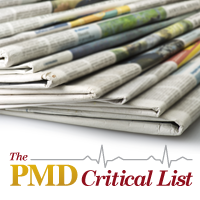- Revenue Cycle Management
- COVID-19
- Reimbursement
- Diabetes Awareness Month
- Risk Management
- Patient Retention
- Staffing
- Medical Economics® 100th Anniversary
- Coding and documentation
- Business of Endocrinology
- Telehealth
- Physicians Financial News
- Cybersecurity
- Cardiovascular Clinical Consult
- Locum Tenens, brought to you by LocumLife®
- Weight Management
- Business of Women's Health
- Practice Efficiency
- Finance and Wealth
- EHRs
- Remote Patient Monitoring
- Sponsored Webinars
- Medical Technology
- Billing and collections
- Acute Pain Management
- Exclusive Content
- Value-based Care
- Business of Pediatrics
- Concierge Medicine 2.0 by Castle Connolly Private Health Partners
- Practice Growth
- Concierge Medicine
- Business of Cardiology
- Implementing the Topcon Ocular Telehealth Platform
- Malpractice
- Influenza
- Sexual Health
- Chronic Conditions
- Technology
- Legal and Policy
- Money
- Opinion
- Vaccines
- Practice Management
- Patient Relations
- Careers
The PMD Critical List: Docs Like, But Don't Use, Telemedicine
A new study finds family physicians think telemedicine is beneficial, but only a small percentage actually use it. That story tops this week’s PMD Critical List. Also on the list, Tennessee doctors want to keep their expert witness fees private and Britain has trouble attracting English-speaking doctors.

A new study finds family physicians think telemedicine is beneficial, but only a small percentage actually use it. That story tops this week’s PMD Critical List. Also on the list, Tennessee doctors want to keep their expert witness fees private and Britain has trouble attracting English-speaking doctors.
• Study on Family Physicians & Telehealth (iHealthBeat)
While the majority of family physicians see benefits to telehealth, few are actually using such technology, according a recent American Family Physician survey. About 80% of FPs think telehealth improves access to care, but just 15% used it in the past year.
• A Very Sick Doctor? (New York Daily News)
A leading New York City physician-specialist has been accused of forcing a female doctor colleague into a sexual relationship in order to keep her job. Dr. Irina Mikolaenko says Dr. David Zagzag ran a “sexually charged" lab at NYU Langone Medical Center.
• Doctor Attacks Uber Driver (CBS)
It’s an unsettling scene that went totally viral this week: “A South Florida doctor was caught on camera physically and verbally attacking an Uber driver.” In addition to being suspend from her medical duties, the doctor also had her Uber account closed.
• Sleuthing Doctors Take on the ‘Ultimate Whodunit’ (The Los Angeles Times)
What killed Cromwell? Or Mozart? Report about the “growing subculture of physicians across the country” who are piecing together the cause of death of historic figure. Solving “a puzzle that combines their diagnostic skill and medical intuition with biographical research, archival excavation, epidemiological sleuthing, and a dash of guesswork.”
• Why Are Placebos Becoming More Effective? (The New York Post)
“Researchers have found a sizable surge in the placebo effect in Americans when studying anti-depressants, anti-psychotics and pain medications.” According to a new book, “doctors can harness the strength of the mind and the power of care when treating patients.”
• Primary Care within a Dental Practice (Northeastern University)
Two prominent eastern universities (one dental school, one nursing school) have launched a new program joining nurse-​practitioner and dental students together in a clinic to provide both primary care and dental services. School leaders are calling it a “cutting-​​edge model of care that offers patients access to healthcare that they other­wise might not have.”
• Doctors Want ‘Court Expert’ Pay Kept Private (The Tennessean)
A report about Tennessee physicians backing legislation “that would prevent any public release of an expert's compensation” during court cases. The fear is “that revealing such information would prevent doctors specifically from providing crucial opinions” during trials.
• Doctors Make Their Own ‘End-of-Life’ Care Decisions (ABC News)
According to two new surveys, “the way doctors face end-of-life care differs from the approach of the general public.” Research suggests that “doctors are actually less inclined to seek heroic medical care” in the end. “We're not saving lives—we're prolonging dying.”
• European Union Doctors Face Language Barrier (The Telegraph)
UK helped wanted: English-speaking physicians. New data show that almost half of European doctors seeking to work in Britain have been refused entry for poor English speaking skills. Newly introduced language tests for foreign nurses, identified the lacking in doctors.
• Patient-Physician Relationship is Central for Medicine (AMA)
“We desperately need physicians to feel happy in what they do.” This and other hopeful words from a discussion about the future of doctoring with Dr. Abraham Verghese, a Stanford Medical School leader and New York Times bestselling author.
